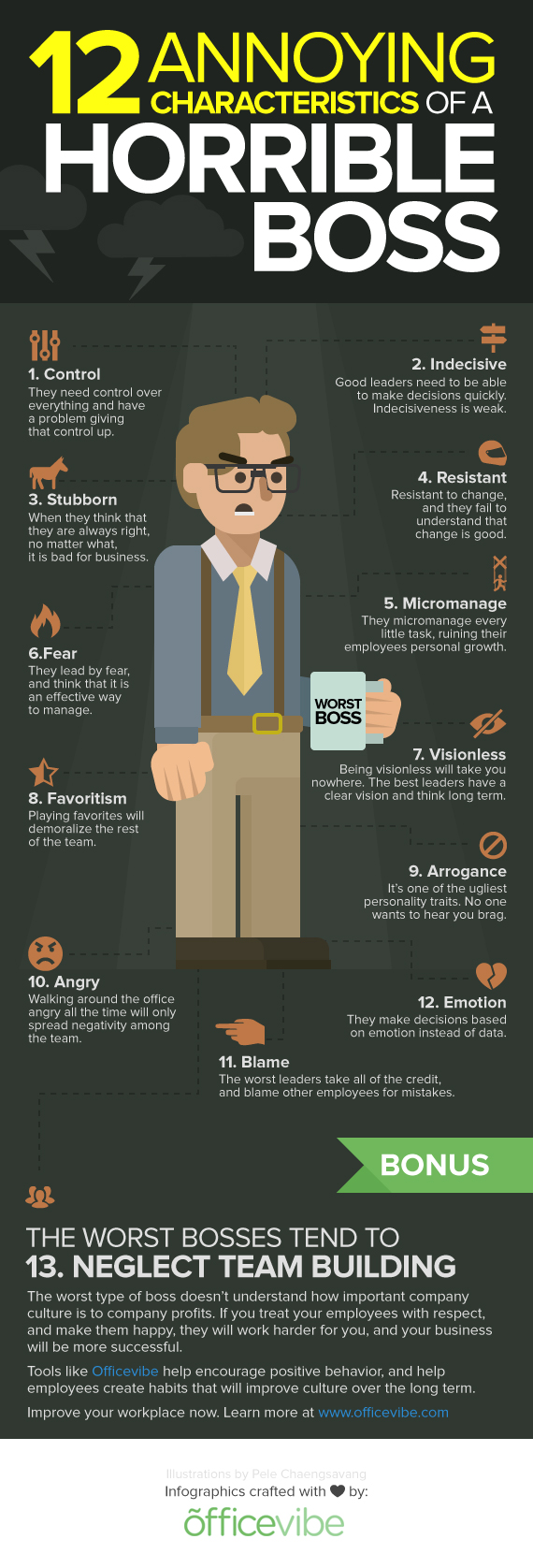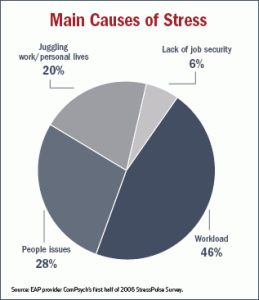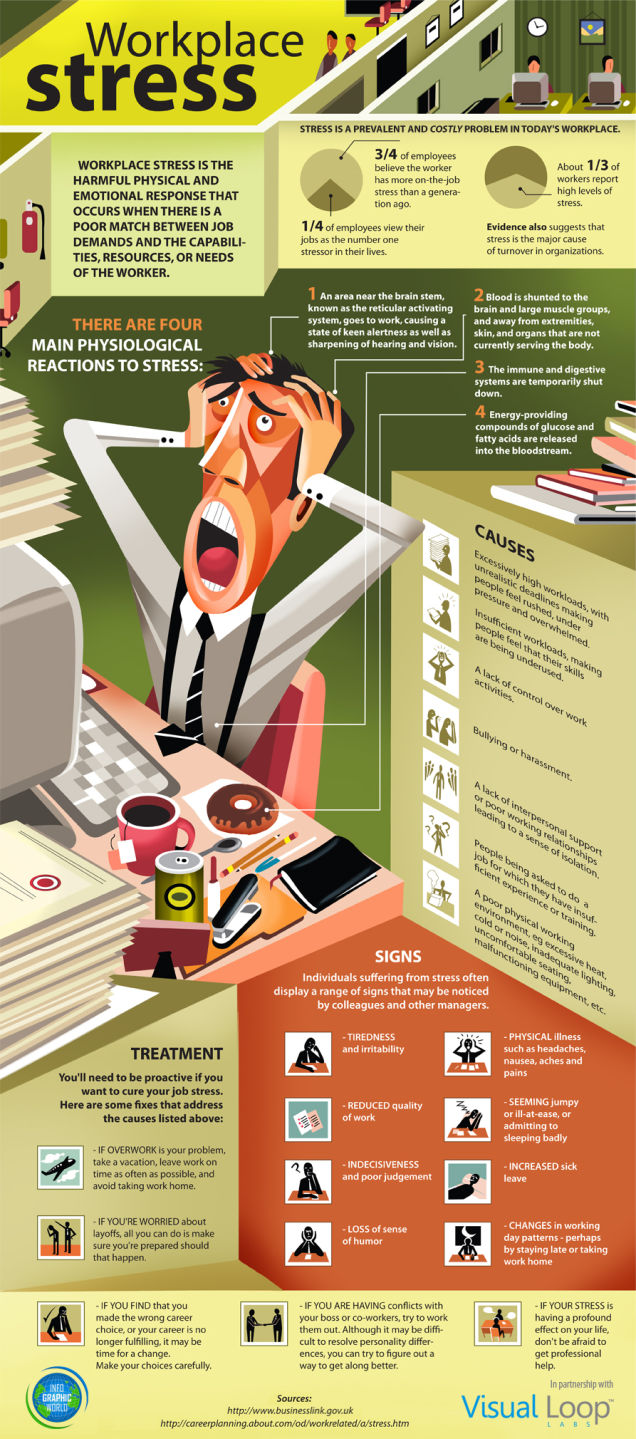On June 18th we discussed the characteristics of a disengaged employee. Today we are going to cover the characteristics that make a terrible boss!
We have all been there before (or are currently living it) where we work or have worked with a manager that was absolutely dreadful. It’s unfortunate but there are are quite a few awful bosses out there and though you may love what you do, they can make for a horrible workplace experience.
The below infographic designed by OfficeVibe titled 12 Annoying Characteristics of a Horrible Boss covers what makes a boss… horrible.
Below the infographic is additional information on each of the characteristics.
How does your boss stack up?

1. Control
A horrible boss tends to focus on assigning busy work to employees without having to or feeling the need to explain why. They don’t motivate or encourage a better workforce and more often than not feedback is not encouraged.
This characteristic reflects a major difference between a boss and a leader. A leader motivates their employees and encourages growth, ideas, and feedback.
2. Indecisive
Horrible managers are often indecisive in what they want completed out of certain tasks. They do not analyze and do not reflect on the outcome but rather go on a whim and think that things are a “great idea” and run with it without considering the pros and cons.
Following through is often not a strong point. Since their initial focus is not on the outcome they don’t want to be blamed if the task were to fail because it will look bad on them.
A great leader on the other hand will evaluate the situation and make the call if a decision will better the company. Leaders aren’t afraid to fail, rather they see it as a learning experience to gain valuable insight from and move on to something new.
3. Stubborn
They aren’t interested in your ideas nor do they want to hear your opinion. Sometimes they even disregard your potentially better idea and then call it their own.
Stubborn managers are extremely difficult to deal with. From an employee aspect, it is difficult to work with a stubborn manager and from a company aspect, it affects the growth of the company negatively.
Leaders encourage ideas. They want their employees to think outside the box and if there is a better way to do something, leaders want their employees to talk about it. Leaders are open-minded enough to that everyone in the office are equals and should be respected as such. Have a new idea? Bring it to the table, let’s talk about it, that is what a leader would want you to do.
4. Resist Change
Poor management doesn’t adapt to change very well. They would much rather have an environment that is static and not change processes within the office.
It is true that many people don’t like change but as a manager it is essential to embrace change.
Growing as a business requires the business and management to constantly reinvent the office environment and business, not only for the employees, for the customers, as well as the health and well-being of the company.
5. Micromanage
If there is one environment that I cannot personally work in is one that the manager micromanages.
A manager that is constantly pestering you about your work whether it is regarding the quality or quantity of what has been done or what is left is quite impossible. Not only are they demotivating their employees but they are ruining the quality of the employees work.
Some of the best places to work are the companies that enforce employee autonomy. These companies give their employees the freedom to accomplish more tasks and do it to their liking.
6. Lead by Fear
In the past, leading by fear was quite common and there are still some horrible managers who use this tactic. This type of management does not work anymore.
A leader leads through inspiration, not intimidation. The modern workplace is a lot more liberal and doesn’t use fear as a form of management.
If you work for a company that encourages or allows this form of management, the company culture is damaged and you may want to consider other options.
7. Visionless
A horrible boss is a boss that doesn’t see the long term vision, rather, they focus only on short term fixes (band-aids).
A lack of vision gives no direction to the employees and can bring down the moral of colleagues.
Great bosses tend to have a roadmap of what to do for the coming weeks, months, and even years.
8. Favoritism
There is no room in the workplace for nepotism (defined: the practice among those with power or influence of favoring relatives or friends, especially by giving them jobs.) and bosses shouldn’t be choosing favorites in the office.
I am a firm believer (as I have learned through experience) that a manager can make friends with employees, however they have to know when to separate personal friendships from business (and this fact goes both ways).
Leaders often see any personal relationship they make with a person as an add-on to being a colleague. Leaders can differentiate work and personal stuff, and they often try to do their best to establish a great relationship with everyone at their office.
9. Arrogance
An arrogant boss can ruin the workplace with their personality because it is these bosses that walk around the office acting like they are the most powerful person in the world.
There is no room for this type of behavior in the workplace. Great leaders tend to check their ego at the door.
Working as a team is essential and working with your team is essential to have engaged workers. It’s not always about personal accomplishments, it’s about accomplishments as a whole.
10. Angry
Angry bosses… well that’s a great way to ruin everybody’s day. They think because they’ve obtained a position of power, they can berate, belittle, and treat others wrong.
Real leaders don’t let emotions get the best of them. They also know the importance of a good workplace environment.
11. Blame-Shifter
They are also known as finger-pointers. Similar to someone who makes excuses all the time, this type of manager will place blame on others instead of taking it on themselves.
A great leader is able to hone up to any mistakes that they make, and even more impressive, they’ll often time take blame for any mistakes that employees have made. Just because they were not there to correct any mistakes.
12. Driven by Emotion
A horrible boss is driven by emotion. Decisions that are made by emotion without thinking through the process more often than not are the wrong decision.
A great leader keeps their emotions in check. They use rational thoughts when making decisions.






